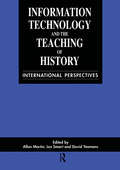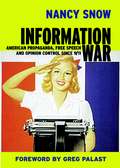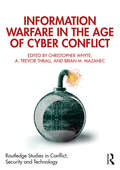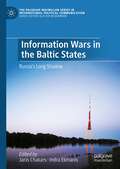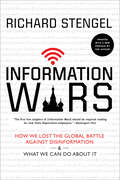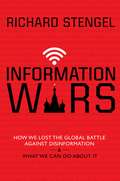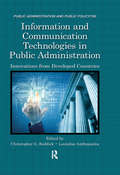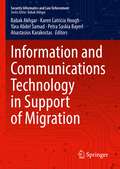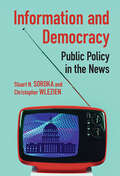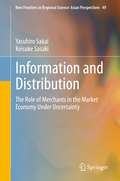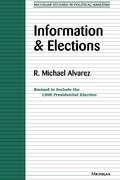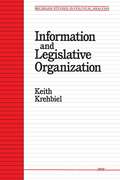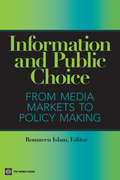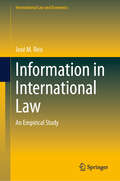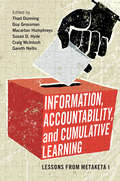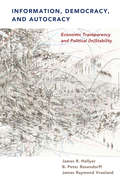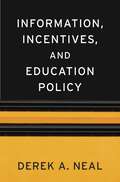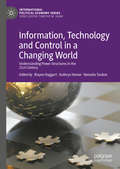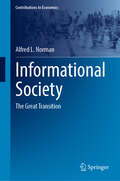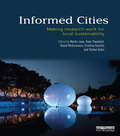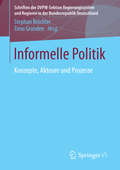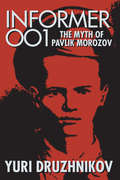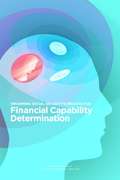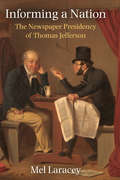- Table View
- List View
Information Technology in the Teaching of History: International Perspectives
by David Yeomans Lez Smart Allan MartinInformation technology offers powerful tools to facilitate and to assist learning across the whole curriculum; the computer is certainly the most significant development in educational technology in the twentieth century. History may be thought of as a staid and perhaps tradition-bound subject, more resistant to change than some areas. Yet in history too, information technology is making an impact. This volume shows how information technology is currently contributing to, and bringing about changes in the way history is taught and learned. The international selection of the contributions shows that these phenomena are not restricted to just one country. The impact of information technology on history curricula is explored in depth in one section of the book, whilst other sections focus on classroom activities and issues, on the development of software for history, and on the relevance of current information technology developments. But the question which lies at the heart of it all remains that of how information technology can enhance the teacher's ability to offer situations in which learners can form and develop a real understanding of the nature of historical processes, and the ways in which they can be studied.
Information War: American Propaganda, Free Speech and Opinion Control Since 9-11 (Open Media Series)
by Greg Palast Nancy SnowIn Information War, former United States Information Agency employee Nancy Snow describes how U.S. propaganda efforts and covert operations are expanding more rapidly today than at any other time in U.S. history, as the Bush administration attempts to increase U.S. dominance by curbing dissent and controlling opinion. Snow lays out the propaganda techniques that the government uses to control dissent in the twenty-first century, spotlights the key players and their spinmeistering abilities in the information war, and describes memorable "leaks" in the Administration's efforts to conduct stealth propaganda programs and control information at home. Ultimately she shows that dissent and true democracy are the early casualties of these policies.
Information Warfare in the Age of Cyber Conflict (Routledge Studies in Conflict, Security and Technology)
by Christopher Whyte Brian M. Mazanec Trevor ThrallThis book examines the shape, sources and dangers of information warfare (IW) as it pertains to military, diplomatic and civilian stakeholders. Cyber warfare and information warfare are different beasts. Both concern information, but where the former does so exclusively in its digitized and operationalized form, the latter does so in a much broader sense: with IW, information itself is the weapon. The present work aims to help scholars, analysts and policymakers understand IW within the context of cyber conflict. Specifically, the chapters in the volume address the shape of influence campaigns waged across digital infrastructure and in the psychology of democratic populations in recent years by belligerent state actors, from the Russian Federation to the Islamic Republic of Iran. In marshalling evidence on the shape and evolution of IW as a broad-scoped phenomenon aimed at societies writ large, the authors in this book present timely empirical investigations into the global landscape of influence operations, legal and strategic analyses of their role in international politics, and insightful examinations of the potential for democratic process to overcome pervasive foreign manipulation. This book will be of much interest to students of cybersecurity, national security, strategic studies, defence studies and International Relations in general.
Information Wars in the Baltic States: Russia’s Long Shadow (The Palgrave Macmillan Series in International Political Communication)
by Janis Chakars Indra EkmanisThis edited volume, featuring accomplished scholars, is about the information wars in the Baltic states, a battle that pits Russia against the West with Estonia, Latvia and Lithuania as sites of contention for great power politics. Chapters address responses from titular populations, local Russian speakers, national governments, activists, journalists, and NATO, as well as the impact of Russian foreign policy on media.
Information Wars: How We Lost the Global Battle Against Disinformation & What We Can Do About It
by Richard StengelA “well-told” insider account of the State Department’s twenty-first-century struggle to defend America against malicious propaganda and disinformation (The Washington Post).Disinformation is nothing new. When Satan told Eve nothing would happen if she bit the apple, that was disinformation. But today, social media has made disinformation even more pervasive and pernicious. In a disturbing turn of events, authoritarian governments are increasingly using it to create their own false narratives, and democracies are proving not to be very good at fighting it.During the final three years of the Obama administration, Richard Stengel, former editor of Time, was an Under Secretary of State on the front lines of this new global information war—tasked with unpacking, disproving, and combating both ISIS’s messaging and Russian disinformation. Then, during the 2016 election, Stengel watched as Donald Trump used disinformation himself. In fact, Stengel quickly came to see how all three had used the same playbook: ISIS sought to make Islam great again; Putin tried to make Russia great again; and we know the rest.In Information Wars, Stengel moves through Russia and Ukraine, Saudi Arabia and Iraq, and introduces characters from Putin to Hillary Clinton, John Kerry, and Mohamed bin Salman, to show how disinformation is impacting our global society. He illustrates how ISIS terrorized the world using social media, and how the Russians launched a tsunami of disinformation around the annexation of Crimea—a scheme that would became a model for future endeavors. An urgent book for our times, now with a new preface from the author, Information Wars challenges us to combat this ever-growing threat to democracy.“[A] refreshingly frank account . . . revealing.” —Kirkus Reviews“This sobering book is indeed needed to help individuals better understand how information can be massaged to produce any sort of message desired.” —Library Journal
Information Wars: How We Lost the Global Battle Against Disinformation and What We Can Do About It
by Richard StengelFrom former Time editor and Under Secretary of State Richard Stengel, this is the first and only insider account of how the U.S. tried--and failed--to combat the global rise of disinformation that eventually spilled into the 2016 election. In February of 2013, Richard Stengel, the former editor of Time, joined the Obama administration as Under Secretary of State for Public Diplomacy and Public Affairs. Within days, two shocking events made worldwide headlines: ISIS executed American journalist James Foley in a graphic video seen by millions, and Vladimir Putin's "little green men"--Russian special forces--invaded Crimea, accompanied by a blizzard of Russian denials and false flags. What these events had in common besides their violent lawlessness is that they were the opening salvos in a new era of global information warfare, in which countries and non-state actors use social media and disinformation to create their own narratives and undermine anyone who opposes them. Stengel was thrust onto the front lines of this battle as he was tasked with responding to the relentless weaponizing of information by ISIS, Russia, China, and others. He saw the scale of what he was up against and found himself hopelessly outgunned. Then, in 2016, the wars Stengel was fighting abroad came home during the presidential election, as "fake news" became a rallying cry and the Russians used the techniques they learned in Ukraine to influence the election here. Rarely has an accomplished journalist been not only a close observer but also a principal participant in American foreign policy as events unfold, issues are debated, and decisions are made. Stengel takes you behind the scenes in the ritualized world of diplomacy, from the daily 8:30 morning huddle with a restless John Kerry to a midnight sit-down in Saudi Arabia with the prince of darkness, Mohammed bin Salman. The result is a compulsively readable account of how this new kind of warfare works and how difficult it is to fight. RICHARD STENGEL was the Under Secretary of State for Public Diplomacy and Public Affairs from 2013 to 2016. Before working at the State Department, he was the editor of Time for seven years, from 2006 to 2013. From 1992 to 1994, he collaborated with Nelson Mandela on the South African leader's autobiography Long Walk to Freedom. Stengel later wrote Mandela's Way, a New York Times bestseller, on his experience working with Mandela. He is the author of several other books, including January Sun, a book about life in a small South African town, as well as You're Too Kind: A Brief History of Flattery. He is an NBC/MSNBC analyst and lives in New York.
Information and Communication Technologies in Public Administration: Innovations from Developed Countries (Public Administration and Public Policy)
by Christopher G. Reddick Leonidas AnthopoulosAn examination of how information technology (IT) can be used in public administration, Information and Communication Technologies in Public Administration: Innovations from Developed Countries examines global perspectives on public administration and IT innovations. This book illustrates the theoretical context of current policies, issues, and imp
Information and Communications Technology in Support of Migration (Security Informatics and Law Enforcement)
by Babak Akhgar Petra Saskia Bayerl Karen Latricia Hough Yara Abdel Samad Anastasios KarakostasThe book provides a holistic review, presenting a multi-stakeholder, multi-disciplinary, international, and evidence-based approach to Information and Communications Technology (ICT) in migration. The book brings together different views and multifaceted responses to ICT-based migration management, examining their overlap, conflict, and synergies. The book is a major addition to the field, tackling important debates concerning humanitarianism and securitization in the reception of migrants, as well as exploring the role of digital technology in aiding migrant integration. The authors explore contentious areas such as the use of new technologies deployed on borders for migration management and border security under the umbrella of smart border solutions including drones, AI algorithms, and face recognition, which are widely criticized for ignoring the fundamental human rights of migrants. The research presented will depart from the euphoric appraisals that technology has made things easier for migrants and those who assist them, to critically examine the bane and boon, benefits and afflictions, highlighting the barriers, as well as the solutions, including several under-researched aspects of digital surveillance and the digital divide.This edited volume has been developed by the MIICT project, funded under the EU Horizon 2020 Action and Innovation programme, under grant agreement No 822380. Provides a positive approach to the integration of migrants, asylum seekers, and refugees using Information and Communications Technology (ICT) solutions Offers a strategic approach to providing digital services for migrants at an EU, national and local level Bridges the gap between academia and front-line practitioners’ work by providing theoretical, policy, ethical, and methodological recommendations
Information and Democracy: Public Policy in the News (Communication, Society and Politics)
by Stuart N. Soroka Christopher WlezienAround the world, there are increasing concerns about the accuracy of media coverage. It is vital in representative democracies that citizens have access to reliable information about what is happening in government policy, so that they can form meaningful preferences and hold politicians accountable. Yet much research and conventional wisdom questions whether the necessary information is available, consumed, and understood. This study is the first large-scale empirical investigation into the frequency and reliability of media coverage in five policy domains, and it provides tools that can be exported to other areas, in the US and elsewhere. Examining decades of government spending, media coverage, and public opinion in the US, this book assesses the accuracy of media coverage, and measures its direct impact on citizens' preferences for policy. This innovative study has far-reaching implications for those studying and teaching politics as well as for reporters and citizens.
Information and Distribution: The Role of Merchants in the Market Economy Under Uncertainty (New Frontiers in Regional Science: Asian Perspectives #49)
by Yasuhiro Sakai Keisuke SasakiThe purpose of this book is to discuss the relationship between information and distribution, with special reference to the role of the merchant in a market economy under conditions of risk and uncertainty. By working with simple models of the market economy and conducting a sequence of comparative analyses, the authors shed new light on an important yet rather neglected area in economics. In a historical perspective, the merchants of Ohmi, the former name of Shiga Prefecture in western Japan, are known to have put great faith in the principles of Sampo Yoshi or the all-around advantages of trading. It is hoped that the results presented in this book will provide some solid ground for such an old principle that can be seen in a new light. Applications to regional and many related problems are also discussed here. A distribution system is broadly defined as the systematic mechanisms and structures that regulate business operations, and its function is to maximize corporate value. Some of the following functions have previously been identified as distinguishing features of the Japanese distribution system compared with distribution systems in Europe and the United States: not only transactions, transportation, and storage, but also information, risk-bearing functions, and other characteristics. This book provides an overview of the distribution system in Japan, including changes that its practice have undergone and its current state; identifies current problems; and considers how these problems should be addressed.
Information and Elections
by R. Michael AlvarezR. Michael Alvarez examines how voters make their decisions in presidential elections. He begins with the assumption that voters have neither the incentive nor the inclination to be well-informed about politics and presidential candidates. Candidates themselves have incentives to provide ambiguous information about themselves, their records and their issue positions. Yet the author shows that a tremendous amount of information is made available about presidential candidates. And he uncovers clear and striking evidence that people are not likely to vote for candidates about whom they know very little. Alvarez explores how voters learn about candidates through the course of a campaign. He provides a detailed analysis of the media coverage of presidential campaigns and shows that there is a tremendous amount of media coverage of these campaigns, that much of this coverage is about issues and is informative, and that voters learn from this coverage. The paperback edition of this work has been updated to include information on the 1996 Presidential election. Information and Electionsis a book that will be read by all who are interested in campaigns and electoral behavior in presidential and other elections. "Thoughtfully conceptualized, painstakingly analyzed, with empirically significant conclusions on presidential election voting behavior, this book is recommended for both upper-division undergraduate and graduate collections. " --Choice R. Michael Alvarez is Associate Professor of Political Science, California Institute of Technology.
Information and Legislative Organization
by Keith KrehbielPresents an alternative informational theory of legislative politics to challenge the conventional view
Information and Public Choice: From Media Markets to Policymaking
by Roumeen IslamThe ability of the media to affect outcomes in economic and political markets has been well documented. News reporting and advertising influence consumer behavior in goods and services markets by revealing (or selectively revealing) information about a product, acting as agenda setters to influence consumer demand, or enhancing competition in markets by alerting consumers to substitutes. In political markets, they can affect behavior by informing voters about a politician's views or actions, enlightening citizens to outcomes of public policy, or taking a stance on political, social, or economic issues. For businesses, households, and most others, the media is the main source of information on public policy choices and current social and economic conditions. As a result, what news the media chooses to gather, analyze and disseminate--and the slant they choose to put on what they report--is of consequence. 'Information and Public Choice' addresses the factors that affect the content and reach of news coverage as well as its impact on public policy. The book addresses both market constraints that affect media--particularly news content--and the impact that news reporting has on economic and political choices. The authors examine a range of issues, including bias or slant in media reporting, the impact of markets and nonmarket factors on news reporting, and the role of government regulation of the media sector in developing countries. The studies in this volume provide new evidence and a good summary of previous research on the power of the media. An invaluable guide for those concerned about the impact of media on economic and political outcomes, 'Information and Public Choice' draws attention to an under-researched yet important area of economics.
Information in International Law: An Empirical Study (International Law and Economics)
by José M. ReisExamining state behavior, this book sheds light on the often-overlooked role of information production and diffusion in international law and relations. Most theories of public international law and state behavior rely on a certain degree of international law-related information, such as an international legal ruling, being made public and diffused to reach various key actors such as third states or domestic actors. However, while assumptions about information being produced and diffused permeate international legal scholarly work, these assumptions have not been systematically and empirically evaluated. Based on an empirical analysis, the author challenges prevailing assumptions by systematically evaluating the accessibility and dissemination of crucial international law related information such as treaty negotiation documents or legal rulings. Using a variety of quantitative case studies on key stages of international lawmaking and covering various issue-areas, from human rights to trade law, each chapter traverses three critical levels of analysis, namely whether international law information is public and transparent, whether the information is salient and reaches the general public, and how the information is framed by the media and political elites. The book will appeal to students, researchers, and scholars of law, political science, and economics, as well as policy-makers interested in a better understanding of information production and diffusion in international law and the impact of public opinion on compliance with international law.
Information, Accountability, and Cumulative Learning: Lessons from Metaketa I (Cambridge Studies in Comparative Politics)
by Susan D. Hyde Thad Dunning Macartan Humphreys Guy Grossman Craig McIntosh Gareth NellisThroughout the world, voters lack access to information about politicians, government performance, and public services. Efforts to remedy these informational deficits are numerous. Yet do informational campaigns influence voter behavior and increase democratic accountability? Through the first project of the Metaketa Initiative, sponsored by the Evidence in Governance and Politics (EGAP) research network, this book aims to address this substantive question and at the same time introduce a new model for cumulative learning that increases coordination among otherwise independent researcher teams. It presents the overall results (using meta-analysis) from six independently conducted but coordinated field experimental studies, the results from each individual study, and the findings from a related evaluation of whether practitioners utilize this information as expected. It also discusses lessons learned from EGAP's efforts to coordinate field experiments, increase replication of theoretically important studies across contexts, and increase the external validity of field experimental research.
Information, Democracy and Autocracy: Economic Transparency and Political (In)Stability
by James Raymond Vreeland James R. Hollyer B. Peter RosendorffAdvocates for economic development often call for greater transparency. But what does transparency really mean? What are its consequences? This breakthrough book demonstrates how information impacts major political phenomena, including mass protest, the survival of dictatorships, democratic stability, as well as economic performance. The book introduces a new measure of a specific facet of transparency: the dissemination of economic data. Analysis shows that democracies make economic data more available than do similarly developed autocracies. Transparency attracts investment and makes democracies more resilient to breakdown. But transparency has a dubious consequence under autocracy: political instability. Mass-unrest becomes more likely, and transparency can facilitate democratic transition - but most often a new despotic regime displaces the old. Autocratic leaders may also turn these threats to their advantage, using the risk of mass-unrest that transparency portends to unify the ruling elite. Policy-makers must recognize the trade-offs transparency entails.
Information, Incentives, and Education Policy (The\sanford J. Grossman Lectures In Economics Ser.)
by Derek A. NealHow do we ensure that waste and inefficiency do not undermine the mission of publicly funded schools? Derek Neal writes that economists must analyze education policy in the same way they analyze other procurement problems. Insights from research on incentives and contracts in the private sector point to new approaches that could induce publicly funded educators to provide excellent education, even though taxpayers and parents cannot monitor what happens in the classroom. Information, Incentives, and Education Policy introduces readers to what economists know—and do not know—about the logjams created by misinformation and disincentives in education. Examining a range of policy agendas, from assessment-based accountability and centralized school assignments to charter schools and voucher systems, Neal demonstrates where these programs have been successful, where they have failed, and why. The details clearly matter: there is no quick-and-easy fix for education policy. By combining elements from various approaches, economists can help policy makers design optimal reforms. Information, Incentives, and Education Policy is organized to show readers how standard tools from economics research on information and incentives speak directly to some of the most crucial issues in education today. In addition to providing an overview of the pluses and minuses of particular programs, each chapter includes a series of exercises that allow students of economics to work through the mathematics for themselves or with an instructor’s assistance. For those who wish to master the models and tools that economists of education should use in their work, there is no better resource available.
Information, Power, and Democracy
by Nico StehrThe link between liberty and knowledge is neither static nor simple. Until recently the mutual support between knowledge, science, democracy and emancipation was presupposed. Recently, however, the close relationship between democracy and knowledge has been viewed with skepticism. The growing societal reliance on specialized knowledge often appears to actually undermine democracy. Is it that we do not know enough, but that we know too much? What are the implications for the freedom of societies and their citizens? Does knowledge help or heed them in unraveling the complexity of new challenges? This book systematically explores the shifting dynamics of knowledge production and the implications for the conditions and practices of freedom. It considers the growth of knowledge about knowledge and the impact of an evolving media. It argues for a revised understanding of the societal role of knowledge and presents the concept of 'knowledge societies' as a major resource for liberty.
Information, Technology and Control in a Changing World: Understanding Power Structures in the 21st Century (International Political Economy Series)
by Blayne Haggart Natasha Tusikov Kathryn HenneThis book explores the interconnected ways in which the control of knowledge has become central to the exercise of political, economic, and social power. Building on the work of International Political Economy scholar Susan Strange, this multidisciplinary volume features experts from political science, anthropology, law, criminology, women’s and gender studies, and Science and Technology Studies, who consider how the control of knowledge is shaping our everyday lives. From “weaponised copyright” as a censorship tool, to the battle over control of the internet’s “guts,” to the effects of state surveillance at the Mexico–U.S. border, this book offers a coherent way to understand the nature of power in the twenty-first century.
Informational Society: The Great Transition (Contributions to Economics)
by Alfred L. NormanThis book explores the transition into a future economy where human work is largely replaced by automation. As this transition takes place job destruction will outpace job creation resulting in increasing unemployment. The author theorizes that the key challenges in managing this transition will be providing income for the unemployed, reforming a government dominated by the wealthy and corporate interests, and creating new social structures to replace work as a central focus of life. The book begins with a discussion of the concept of bounded rationality and how it influences the pace of technological adoption. The author also discusses how advances in technology—particularly in automation—affect both physical and informational tasks, transforming industries and reducing employment across sectors. Next, the author turns to government, addressing successes and failures in addressing current issues like climate change, immigration, economic inequality, and government capture by the wealthy and corporations. Government reform is essential for managing the social and economic impacts of automation. Positing that the transition period will begin between 2030 and 2050, the author recommends that planning should begin now to implement solutions, including a negative income tax, affordable housing, and a shift towards leisure-based social organization.
Informed Cities: Making Research Work for Local Sustainability
by Marko Joas Kate Theobald Cristina Garzillo David McGuinness Stefan KuhnInformed Cities looks at the knowledge brokerage processes between cities and higher education institutions, and in particular evaluates governance mechanisms for monitoring local sustainability and the role of research within this. The first part of the book provides an analysis of tools for governing sustainable cities and develops a typology of existing tools. It then considers approaches to monitor local sustainability on a European level, focusing on a number of key tools such as the Covenant of Mayors, Reference Framework for Sustainable Cities, and Green Capital Award. The second part of the book introduces an explorative application of two tools that the author team have used in practice to monitor local sustainability, Urban Ecosystems Europe and Local Evaluation 21, presenting and evaluating European level data collected from local governments. The third part of the book looks deeper into a number of case studies discussing how a working and rewarding city-university connection can be created and nourished in an administrative and political setting. Finally, the last part of the book reflects on lessons learned from the application of the tools and accompanying research process and makes recommendations for further developing monitoring tools for urban sustainability on a European level. This book will be essential reading for professionals in urban and regional planning who are tasked with monitoring the effects of sustainability policies, as well as for graduate students in planning, environmental governance, sustainable development and related disciplines.
Informelle Politik
by Stephan Bröchler Timo Grunden,,Wirklich wichtige Entscheidungen werden ausnahmslos in Gremien getroffen, die es nicht gibt. " Walter Scheel wird gewusst haben, wovon er sprach. Die Verfassungswirklichkeit der Bundesrepublik Deutschland erschließt sich nicht allein durch das Staatsorganisationsrecht. Regieren ist auch ein Prozess, der in informelle Entscheidungszentren verlagert wird, der ungeschriebenen Regeln folgt und den beteiligten Akteuren ein politisches Praxiswissen abverlangt. Aus diesem Grund wird ,,informelles Regieren" immer mehr zu einem Schlüsselbegriff der Regierungsforschung. Die informellen Institutionen und politischen Praktiken des Regierens sind der Gegenstand dieses Bandes. Die Autorinnen und Autoren setzen sich kritisch mit Analysekonzepten zum ,,Informellen Regieren" auseinander und präsentieren neue empirische Erkenntnisse.
Informer 001: The Myth of Pavlik Morozov
by Yuri DruzhnikovWhen Russia was in the throes of Joseph Stalin's campaign for the forced collectivization of Soviet agriculture, a young boy named Pavlik Morozov informed the OGPU (later called the KGB) that his father was an enemy of the regime. As a result, Pavlik's father was arrested and disappeared in a Soviet concentration camp. Enemies of the party later killed the boy, whereupon people proclaimed him a hero. After that, Pavlik Morozov's glory surpassed the fame of many Russian heroes. Hundreds of works have been published about the boy in various genres; his portrait has graced galleries, postcards, and postage stamps; ships and libraries have been dedicated in his honor.Informer 001 is the first independent study of the Morozov affair. Yuri Druzhnikov examined documents, visited museums, and interviewed everyone who knew Morozov during his short lifetime. In book after book, he discovered inconsistencies in every fact, from where Morozov was born to how old he was at the time of his death.As Druzhnikov pieced together the story about Morozov's life, death, and legacy, it became clear that the campaign to keep Morozov a hero was centrally directed. Informer hero number 001 remained a fearful reminder to all; to those who inform, and those who become the victims of denunciations. Informer 001 offers Western readers a unique glimpse into the behind-the-scenes operations of Soviet political history and will be fascinating for the general public, as well as for sociologists, historians, and Russian studies specialists.
Informing Social Security’s Process for Financial Capability Determination
by Engineering Medicine National Academies of SciencesThe U.S. Social Security Administration (SSA) provides benefits to disabled adults and children, offering vital financial support to more than 19 million disabled Americans. Of that group, approximately 5.5 million have been deemed – by virtue of youth or mental or physical impairment - incapable of managing or directing the management of their benefits. Hence, a representative payee has been appointed to receive and disburse SSA payments for these beneficiaries to ensure that their basic needs for shelter, food, and clothing are met. Periodically, however, concerns have been expressed about the accuracy of the process by which SSA determines whether beneficiaries are capable of managing their benefits, with some evidence suggesting that underdetection of incapable recipients may be a particular problem. The importance of creating as accurate a process as possible for incapability determinations is underscored by the consequences of incorrectly identifying recipients either as incapable when they can manage their benefits or as capable when they cannot. Failure to identify beneficiaries who are incapable of managing their funds means abandoning a vulnerable population to potential homelessness, hunger, and disease. Informing Social Security’s Process for Financial Capability Determination considers capability determination processes used by other similar benefit programs, abilities required to manage, and direct the management of, benefits, and effective methods and measures for assessing capability. This report evaluates SSA’s capability determination process for adult beneficiaries and provides recommendations for improving the accuracy and efficiency of the agency’s policy and procedures for making these determinations.
Informing a Nation: The Newspaper Presidency of Thomas Jefferson
by Melvin LaraceyDuring his presidency, Thomas Jefferson both sponsored and wrote for his own newspaper, the National Intelligencer and Washington Advertiser. The newspaper spoke on behalf of his policies and those of his Republican, anti-federalist party, the Democratic-Republicans, the precursor to today’s Democrats. Author Mel Laracey focuses on the newspaper’s message during Jefferson’s first term, showing how the third president used media to promote his administration and its goals against their political rivals, the Federalists. Informing a Nation shows how Jefferson and his allies dealt with political challenges, reveals hitherto unexamined aspects of the early presidency, and raises broad questions of the relationship between the presidency and media today.
